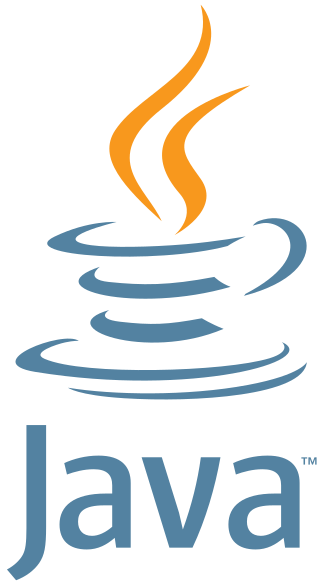
Java is a high-level, class-based, object-oriented programming language that is designed to have as few implementation dependencies as possible. It is a general-purpose programming language intended to let programmers write once, run anywhere (WORA), meaning that compiled Java code can run on all platforms that support Java without the need to recompile. Java applications are typically compiled to bytecode that can run on any Java virtual machine (JVM) regardless of the underlying computer architecture. The syntax of Java is similar to C and C++, but has fewer low-level facilities than either of them. The Java runtime provides dynamic capabilities that are typically not available in traditional compiled languages.
Pretty Good Privacy (PGP) is an encryption program that provides cryptographic privacy and authentication for data communication. PGP is used for signing, encrypting, and decrypting texts, e-mails, files, directories, and whole disk partitions and to increase the security of e-mail communications. Phil Zimmermann developed PGP in 1991.
Java Platform, Standard Edition is a computing platform for development and deployment of portable code for desktop and server environments. Java SE was formerly known as Java 2 Platform, Standard Edition (J2SE).

A JAR file is a package file format typically used to aggregate many Java class files and associated metadata and resources into one file for distribution.
In computing, the Java Cryptography Architecture (JCA) is a framework for working with cryptography using the Java programming language. It forms part of the Java security API, and was first introduced in JDK 1.1 in the java.security package.
HotSpot, released as Java HotSpot Performance Engine, is a Java virtual machine for desktop and server computers, developed by Sun Microsystems which was purchased by and became a division of Oracle Corporation in 2010. Its features improved performance via methods such as just-in-time compilation and adaptive optimization. It is the de facto Java Virtual Machine, serving as the reference implementation of the Java programming language.
In computing, Java Web Start is a deprecated framework developed by Sun Microsystems that allows users to start application software for the Java Platform directly from the Internet using a web browser. The technology enables seamless version updating for globally distributed applications and greater control of memory allocation to the Java virtual machine.
Java Card is a software technology that allows Java-based applications (applets) to be run securely on smart cards and more generally on similar secure small memory footprint devices which are called "secure elements" (SE). Today, a secure element is not limited to its smart cards and other removable cryptographic tokens form factors; embedded SEs soldered onto a device board and new security designs embedded into general purpose chips are also widely used. Java Card addresses this hardware fragmentation and specificities while retaining code portability brought forward by Java.
Bouncy Castle is a collection of APIs used for implementing cryptography in computer programs. It includes APIs for both the Java and the C# programming languages. The APIs are supported by a registered Australian charitable organization: Legion of the Bouncy Castle Inc.
In the Java computer programming language, an annotation is a form of syntactic metadata that can be added to Java source code. Classes, methods, variables, parameters and Java packages may be annotated. Like Javadoc tags, Java annotations can be read from source files. Unlike Javadoc tags, Java annotations can also be embedded in and read from Java class files generated by the Java compiler. This allows annotations to be retained by the Java virtual machine at run-time and read via reflection. It is possible to create meta-annotations out of the existing ones in Java.

Java is a set of computer software and specifications that provides a software platform for developing application software and deploying it in a cross-platform computing environment. Java is used in a wide variety of computing platforms from embedded devices and mobile phones to enterprise servers and supercomputers. Java applets, which are less common than standalone Java applications, were commonly run in secure, sandboxed environments to provide many features of native applications through being embedded in HTML pages.

Network Security Services (NSS) is a collection of cryptographic computer libraries designed to support cross-platform development of security-enabled client and server applications with optional support for hardware TLS/SSL acceleration on the server side and hardware smart cards on the client side. NSS provides a complete open-source implementation of cryptographic libraries supporting Transport Layer Security (TLS) / Secure Sockets Layer (SSL) and S/MIME. NSS releases prior to version 3.14 are tri-licensed under the Mozilla Public License 1.1, the GNU General Public License, and the GNU Lesser General Public License. Since release 3.14, NSS releases are licensed under GPL-compatible Mozilla Public License 2.0.
The Java language has undergone several changes since JDK 1.0 as well as numerous additions of classes and packages to the standard library. Since J2SE 1.4, the evolution of the Java language has been governed by the Java Community Process (JCP), which uses Java Specification Requests (JSRs) to propose and specify additions and changes to the Java platform. The language is specified by the Java Language Specification (JLS); changes to the JLS are managed under JSR 901. In September 2017, Mark Reinhold, chief Architect of the Java Platform, proposed to change the release train to "one feature release every six months" rather than the then-current two-year schedule. This proposal took effect for all following versions, and is still the current release schedule.
In cryptography, PKCS #12 defines an archive file format for storing many cryptography objects as a single file. It is commonly used to bundle a private key with its X.509 certificate or to bundle all the members of a chain of trust.
There are various implementations of the Advanced Encryption Standard, also known as Rijndael.
The Java Development Kit (JDK) is a distribution of Java technology by Oracle Corporation. It implements the Java Language Specification (JLS) and the Java Virtual Machine Specification (JVMS) and provides the Standard Edition (SE) of the Java Application Programming Interface (API). It is derivative of the community driven OpenJDK which Oracle stewards. It provides software for working with Java applications. Examples of included software are the Java virtual machine, a compiler, performance monitoring tools, a debugger, and other utilities that Oracle considers useful for Java programmers.
The Transport Layer Security (TLS) protocol provides the ability to secure communications across or inside networks. This comparison of TLS implementations compares several of the most notable libraries. There are several TLS implementations which are free software and open source.
IAIK-JCE is a Java-based Cryptographic Service Provider, which is being developed at the Institute for Applied Information Processing and Communications (IAIK) at the Graz University of Technology. It offers support for many commonly used cryptographic algorithms, such as hash functions, message authentication codes, symmetric, asymmetric, stream and block encryption. Its development started in 1996 and as such IAIK-JCE was one of the first Java-based cryptography providers. It is written entirely in Java and based on the same design principles as Oracle's JCA/JCE.
Dell BSAFE, formerly known as RSA BSAFE, is a FIPS 140-2 validated cryptography library, available in both C and Java. BSAFE was initially created by RSA Security, which was purchased by EMC and then, in turn, by Dell. When Dell sold the RSA business to Symphony Technology Group in 2020, Dell elected to retain the BSAFE product line. BSAFE was one of the most common encryption toolkits before the RSA patent expired in September 2000. It also contained implementations of the RCx ciphers, with the most common one being RC4. From 2004 to 2013 the default random number generator in the library was a NIST-approved RNG standard, widely known to be insecure from at least 2006, containing a kleptographic backdoor from the American National Security Agency (NSA), as part of its secret Bullrun program. In 2013 Reuters revealed that RSA had received a payment of $10 million to set the compromised algorithm as the default option. The RNG standard was subsequently withdrawn in 2014, and the RNG removed from BSAFE beginning in 2015.
The tables below compare cryptography libraries that deal with cryptography algorithms and have application programming interface (API) function calls to each of the supported features.




